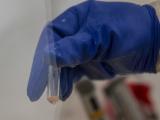Sep 26, 2007 (CIDRAP News) – The federal government has awarded a $400 million contract to Emergent BioSolutions for another 18.75 million doses of anthrax vaccine, with a bonus to be paid if the company wins approval for extending the vaccine's shelf life.
The 3-year contract for BioThrax vaccine, also known as Anthrax Vaccine Adsorbed (AVA), is worth up to $448 million, according to the US Department of Health and Human Services (HHS). The vaccine will go into the Strategic National Stockpile of drugs and medical supplies for civilian use.
Besides the shelf-life bonus, the contract also provides for bonuses if the company makes progress toward winning regulatory approval for using the vaccine to help protect people after possible exposure to anthrax (postexposure prophylaxis, or PEP). The vaccine is currently approved only for preexposure use.
Emergent BioSolutions, based in Gaithersburg, Md., previously sold a total of 10 million doses of AVA to HHS under contracts awarded in May 2005 and May 2006, according to a company news release.
HHS officials said in a statement today, "Today's acquisition, in addition to the current stockpile of anthrax vaccine, will allow HHS to maintain a stockpile of at least 10 million doses of anthrax vaccine through 2011. In addition, HHS has two current contracts for the acquisition of anthrax antitoxins, to treat individuals with advanced anthrax disease."
The vaccine has an official 3-year shelf life, but the company applied to the Food and Drug Administration (FDA) last year to extend the shelf life to 4 years, the company said. If the FDA approves the application before the new contract expires in September 2010, the company will receive about $34 million to reflect an increase in the vaccine price. The company won't get any of the money if the FDA doesn't approve the change before the contract expires.
Under the contract, HHS also promises to pay Emergent up to $11.5 million for achieving certain steps toward winning a PEP indication for the vaccine, the company said. Officials said they expect to receive $8.8 million of that by the end of this year.
The contract also includes $2.2 million to cover shipping costs for delivering doses to the national stockpile, the company said.
In announcing the purchase, Rear Adm. Craig Vanderwagen, MD, HHS assistant secretary for preparedness and response, said, "Together with the already substantial supply of antibiotics, our nation's first line of defense against an anthrax attack, this additional AVA anthrax vaccine will further broaden the stockpile's medical countermeasures."
The stockpile contains enough antibiotics to treat 40 million people for anthrax, according to Marc Wolfson, a spokesman for the Office of the Assistant Secretary for Preparedness and Response.
AVA, developed in the 1950s, is the only anthrax vaccine licensed in the United States. It requires six doses, with an annual booster recommended thereafter. More than 1.6 US military personnel have received the vaccine since 1998, but some have protested or refused the vaccine because of concern about side effects.
HHS has a goal of acquiring a next-generation anthrax vaccine that would require fewer doses and cause fewer side effects. In 2004 the agency awarded an $877 million contract to VaxGen Inc., based in Brisbane, Calif., for 75 million doses of a vaccine based on a recombinant form of an anthrax protein called protective antigen. But last December HHS canceled the contract after problems with the vaccine's stability caused VaxGen to miss a deadline for starting a phase 2 clinical trial.
HHS still aims to acquire 75 million doses of a new anthrax vaccine, or enough to immunize 25 million people, Wolfson told CIDRAP News by e-mail. He said the agency published a request for information from industry on a recombinant protective antigen (rPA) vaccine in May.
"HHS expects to issue a new rPA anthrax Vaccine Request for Proposals within the next month or so," Wolfson added.
Funds for the anthrax vaccine come from Project BioShield, a $5.6 billion program that Congress established in 2004 to promote development of medical countermeasures for chemical, biological, radiological, and nuclear weapons by guaranteeing that the government would buy promising products.
But major biotechnology companies showed little interest in the program. As a result, last December Congress passed a bill designed to strengthen the program. The bill established the Biomedical Advanced Research and Development Authority within HHS, which can pay contractors when they achieve development milestones, instead of requiring them deliver finished products before they can get paid.
See also:
Sep 26 HHS news release
http://www.hhs.gov/news/press/2007pres/09/20070926a.html
Sep 26 Emergent BioSolutions news release
http://investors.emergentbiosolutions.com/phoenix.zhtml?c=202582&p=irol-newsArticle&ID=1055689
Dec 20, 2006, CIDRAP News story "HHS cancels VaxGen anthrax vaccine contract"
http://www.cidrap.umn.edu/cidrap/content/bt/anthrax/news/dec2006vaxgen.html




















